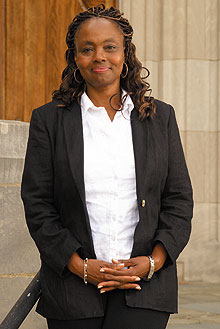  |
| HOME | THIS ISSUE | CALENDAR | GRANTS | BACK ISSUES | < BACK | NEXT > |
Couples have differing perspectives on why they divorced, says researcherby Sherry Fisher - September 8, 2008
|
||||
| Divorced men and women are miles apart when it comes to understanding why their marriage failed, according to Edna Brown. Brown, an assistant professor of human development and family studies in the College of Liberal Arts and Sciences, is studying the implications of race and gender among some 200 people who are divorced. She says males and females have completely different perceptions about what happened during their marriage and why they separated. Females gave more varied reasons for the divorce. “Women said their marriages were abusive, that they fought and argued a lot, had value differences, and that there were alcohol and drug problems,” says Brown. Males gave one reason for the divorce: family interference. Brown says that it’s not surprising that women gave more reasons for marital discord. “Females tend to be more attuned to what’s going on in the marriage,” she says. “They seem to detect when something is wrong in the relationship more easily and more quickly than men do.” Brown says that after listening to narratives of men and women who were formerly married to each other, she could not tell that they were in the same marriage. “We asked them questions about what led up to the divorce, what was happening during the divorce, and what happened immediately after the divorce. We thought we would hear the same story from the husband and wife, but we didn’t. There really are ‘his’ and ‘her’ divorces,” she says. Brown, who came to UConn in fall 2007, is using data for her research from the Early Years of Marriage Study at the University of Michigan’s Survey Research Center, where she was a postdoctoral fellow in developmental psychology. The long-term study started in 1986 with a sample of white American and black American couples whose marriages were studied, in some cases, over a period of up to 18 years. Participants in the study were asked about their coping strategies during the divorce. “Women said they went to marriage counselors, kept journals or diaries, talked to friends, or read self-help books,” Brown says.
“Men, more often than anything, said they used alcohol, probably to avoid dealing with the issues.” She also examined race differences. “White couples were more likely to say they ‘grew apart’ than black couples,” she says. They also used different coping strategies: white couples tended to use marriage counselors and black couples went to religious counselors. Brown is now examining how the reasons people give for getting divorced, and the coping strategies they used, relate to their current adjustment. “I’m interested in people’s psychological well being, such as whether they have depression and anxiety,” she says. “For example, is coming from an abusive marriage related to depression levels for that person today? Or is it related to anxiety or health problems?” She says the research has important implications. “The findings indicate that when you’re trying to help people whose marriages are in trouble, you have to talk to both the husband and wife,” she says. “Just talking to one member of the couple isn’t enough. You want everyone’s perspective.” Could marriages be saved if certain strategies were followed? Brown says getting couples to a counselor is the first step. “I think our research can help counselors understand that men and women think differently about their marriages, but not everybody is willing to get the help they need.” |
| ADVANCE HOME UCONN HOME |

